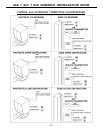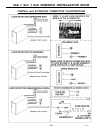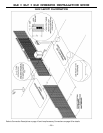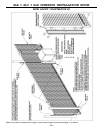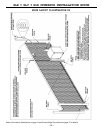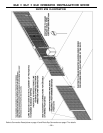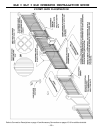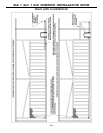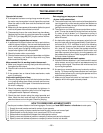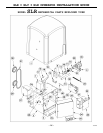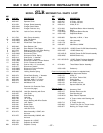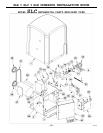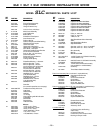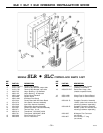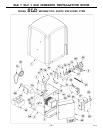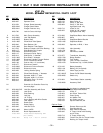
SLR • SLC • SLD OPERATOR INSTALLATION GUIDE
- 25 -
TROUBLESHOOTING
Operator fails to start:
A. If the operator has been running a large number of cycles,
the motor may have gotten hot and tripped the overload.
Allow the motor to cool down and the overload will reset
automatically.
B. Make sure you have power at the master distribution panel
and that the power has not been turned off.
C. The secondary fuse on the control board may have blown.
Replace the fuse (refer to control box parts list on page 30
[SLR & SLC] and page 33 [SLD] for part number informa-
tion).
Motor operates, but gate does not move:
A. In operators with torque limiters and friction pad clutches,
check for signs of slipping. You can mark the sprocket and
clutch with a yellow or white grease pen and watch for the
lines to move apart if slipping is taking place. Adjust the
torque limiter tighter if this is the problem.
B. Check for broken chain or worn belts.
C. Check all setscrews on pulleys and sprockets and tighten
them if necessary, and check for keys which may have
fallen loose from keyways.
Motor sounds like it is working harder than normal:
A. Make sure the gate is moving freely and without binding
throughout its entire travel.
B. Check the drive chain for obstructions (if the operator has
one).
C. If the operator has an internal brake mechanism, make
sure it is releasing.
Limit switch getting out of time:
A. Check for proper tension on all limit chains to be sure there
is no jumping taking place. Mark one tooth and its corre-
sponding link and run the gate. If the marks have moved,
the chain is skipping.
B. Check the setscrews in limit sprockets for tightness. In
rotary limit boxes, check the rotary limit nut for sloppiness
or stripped threads. Replace if necessary.
C. Check the chain tension along the output sprocket and
idlers. Mark the chain and one tooth of the sprocket as
described above and run the gate. Check for jumping.
Gate stopping part way open or closed
(but no visible obstruction):
A. The control board may have received a false obstruction
input triggered by current sensing set too low. Make sure
the gate moves freely through its entire travel before ad-
justing the current sensing.
B. The maximum run timer may have counted down and ex-
pired. This can be caused by having the timer set too low,
if a chain or belt is broken, or if a sprocket or pulley is
slipping. When the timer expires, the gate stops and an
alarm will sound.
C. An obstruction signal from an accessory wired to the ob-
struction input may have triggered falsely. Check the con-
trol board for lit L.E.D. indicators for any of the following
inputs: safety, shadow, open obstruction, close obstruc-
tion, stop, etc. If any are lit when the operator should be
running, remove all devices hooked to that function and
hook them up one at a time and try to run the operator until
the problem device is found. Refer to page 12 for details on
the control board indicators.
Gate staying open with automatic system:
A. If there are vehicle detectors in your machine which are set
up for reverse, one of your loops or loop detectors may be
sending a false signal. Disconnect the wire harness and
try running the operator.
B. An opening or reversing device may be stuck or malfunc-
tioning. Try disconnecting these devices and hook them
back up one at a time and try running the operator until the
malfunctioning device is found.
C. Make sure the close limit switch isn’t activated. If it is, the
operator will think the gate is already closed.
HOW TO ORDER REPLACEMENT PARTS
Use the part numbers listed on the following pages. Contact your local OSCO dealer or distributor to order parts.
1. Supply the model number and serial number of your operator.
2. Specify the quantity of pieces needed and order by part number and name of part.
3. State whether to ship by freight, truck, parcel post, UPS or air express.
4. State whether transportation charges are to be prepaid or collect.
5. Specify name and address of person or company to whom parts are to be shipped.
6. Specify name and address of person or company to whom invoice is to be sent.



